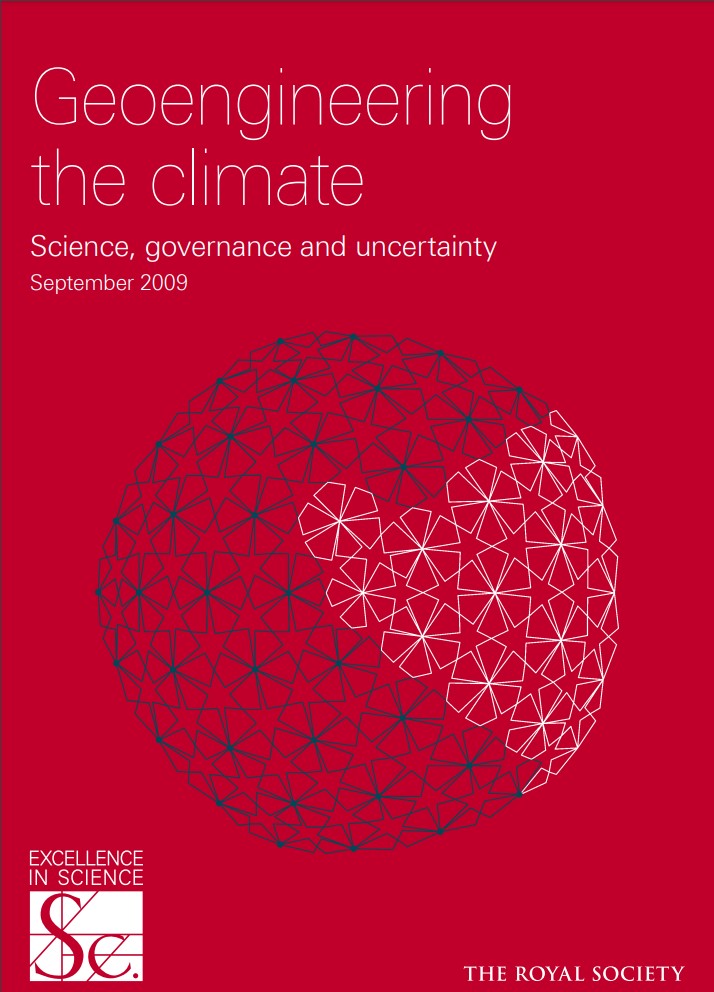Governments are not acting; maybe others could — and should
Originally published at Legal Planet.
Although reductions in greenhouse gas emissions continue to be inadequate to prevent dangerous climate change, solar geoengineering appears able to substantially reduce climate risks. More research, including outdoor experiments, is needed to reduce critical uncertainties. This could pose some environmental risks and — arguably more importantly — will raise diverse social concerns, such as research “sliding” into undue deployment. For these reasons, some additional governance of solar geoengineering may be warranted. For example, the seminal 2009 report on geoengineering from the UK’s Royal Society concluded:

There are serious and complex governance issues which need to be resolved if geoengineering is ever to become an acceptable method for moderating climate change….
The greatest challenges to the successful deployment of geoengineering may be the social, ethical, legal and political issues associated with governance, rather than scientific and technical issues…
The governance challenges posed by geoengineering should be explored in more detail by an international body such as the UN Commission for Sustainable Development, and processes established for the development of policy mechanisms to resolve them.
The 2015 report from the US National Academies makes similar points.
But despite such authoritative calls over more than a decade, governments are still not taking significant action. The UK comes closest to having an actual policy, which merely says “The Government is not deploying SRM [i.e. solar geoengineering], and has no plans to do so. The UK Government has commissioned research into the effects of SRM on climate, and monitors research in this area.” For its part, the US recently joined the list of countries that dedicate modest funds to geoengineering research. But a few million dollars in support is a far cry from comprehensive governance. Internationally, Switzerland tried to get the UN Environment Programme to take up the issue but failed to get sufficient support. There just does not seem to be the political incentive for policy-makers to take on such a controversial issue. Regardless, the resulting lack of dedicated governance is used as grounds to oppose solar geoengineering research, particularly outdoor experiments. For this and other reasons, research has proceeded only slowly.
In a paper recently published in Climatic Change, my Emmett Institute colleague Ted Parson and I explore nonstate actors’ potential to contribute to the governance of solar geoengineering research. Nonstate governance does have some advantages: It can respond more nimbly to dynamic conditions and emerging knowledge, and nonstate actors often can move on controversial matters while national governments are administratively, politically, or legally constrained. In fact, diverse forms of nonstate governance have been effective, particularly in contested and rapidly changing issue areas. Subsequent state oversight can sometimes build on the experience and knowledge generated by nonstate governance.
Although a handful of scholars have suggested that nonstate actors could or should contribute to solar geoengineering governance, we are the first to assess nonstate governance systems in potentially fulfilling the additional near-term needs associated with research. We consider six types of nonstate actors routinely involved in research:
- the researchers themselves,
- the universities or other institutions that employ them,
- funders,
- academic publishers,
- professional societies, and
- advocacy nongovernmental organizations (NGOs), both environmental and other.
We assess the ability of each type to contribute based on the nonstate actors’ capacity, knowledge, and interests.
We conclude that suitably configured collaborations of nonstate actors can effectively and legitimately meet the additional governance needs of near-term solar geoengineering research. First, enabling research requires providing financial support and other necessary resources, coupled with processes to define strategic priorities and to assure high scientific quality. This is routinely and effectively done by nonstate actors in many areas, with roles filled by funders, publishers, and others. Second, control concerns limiting potential harms and risks from research. In view of the resources and authority they deploy, funders and research institutions could play a leading role in defining and implementing norms and procedures. And third, legitimation of the enterprise constitutes a broad social and political attribution of value and responsibility to a wide endeavor and individual projects within it. It emerges somewhat organically from other governance processes: transparent procedures of defining priorities and evaluating scientific quality, assessment of risks, public engagement on potential impacts and societal significance, and more.
It is important to emphasize what we do and do not say in this paper. For one thing, we do not specify the substantive content of governance rules and norms, because defining these will be a task for whatever system is adopted. We address the governance of research, not of potential future deployment. We recognize nonstate governance’s limitations: It might be deemed illegitimate. It may be relatively ineffective in preventing violations. And some critics may suggest that nonstate governance is more vulnerable than state alternatives to capture.
Nonstate governance might actually be preferable to its state counterpart at this stage, even if states could get involved. Nonstate actors can sometimes draw on superior information about and relations with targets of governance, innovate more, respond more rapidly to changes in knowledge or capacity, engage more readily in contested areas, and operate more flexibly across jurisdictions. For solar geoengineering in particular, early formal state action — even in research governance — may risk prematurely locking in early decisions or unhelpfully entangling the issue with other contentious international debates. With the matter uncertain and rapidly developing, a nonstate system could address immediate concerns, help explore key uncertainties, and delay development of a more legalized regime while some of these early uncertainties are explored and better characterized.
